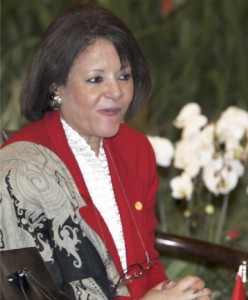What Relationship with the United States Does Sisi Want?
More on:
What kind of relationship with the United States does Egypt’s president Abdel Fattah el-Sisi really want? Friendly and cooperative, or characterized by hostile charges, suspicions, and conspiracy theories?
We have a much better idea today than we did last week, unfortunately. That’s because Sisi has just appointed as his national security advisor an official named Fayza Abu el-Naga.
El-Naga is a long-time Mubarak official who in those days handled foreign aid. Her special role, however, was trying to prevent the United States--or anyone else--from promoting democracy or human rights in Egypt. El-Naga is more than any other current official responsible for the persecution and prosecution of human rights advocates in Egypt, including the prosecution of 43 human rights advocates (including 19 Americans) that began in 2012 with raids on NGO offices.

But that’s not all. Worth equal attention was el-Naga’s explanation of these events, in a statement to the judge investigating this "case:"
The United States decided to use all its resources and tools to contain the situation and push it in a direction that promotes American and also Israeli interests.
In a press conference she added this:
The government will not hesitate to expose foreign schemes that threaten the stability of the homeland.
Who were these awful subversive groups? The International Republican Institute and the National Democratic Institute and Freedom House, to name just three. But note: el-Naga did not just accuse them, she jumped into real conspiracy-theorizing by saying "the United States" was destabilizing Egypt to promote not only our own interests but--of course--Israel’s.
So the choice of el-Naga as his national security adviser is a significant move by Sisi. He has selected someone who believes in repressing dissent and criminalizing human rights advocacy. He has elevated someone who played a central role in ruining our bilateral relations in the last several years. And he has rewarded someone whose first instinct when challenged was to accuse the United States of plotting with Israel against Egyptian stability.
All of which suggests that Sisi, whatever he may say to Secretary of State Kerry in private, has decided that an antagonistic relationship with the United States is a good idea. With Fayza Abu el-Naga advising him, that’s probably unavoidable anyway.
Taking a broader look at the problem of repression under Sisi, I am one of the signers of a letter to the President urging him "to make clear to President al-Sisi that there will be serious consequences if there is a further crackdown on NGOs...." As the letter notes, "The last 18 months in Egypt have seen increased repression of civil society, as well as deeply concerning attempts to criminalize free speech and peaceful assembly." Sisi isn’t repressing the Muslim Brotherhood or violent extremists; he’s repressing everyone who offers a criticism of his regime, many of whom are secular, moderate, and democratic. The Sisi formula won’t produce stability for Egypt, and from a purely pragmatic viewpoint, U.S. silence on repression in Egypt is a mistake.
More on:
 Online Store
Online Store